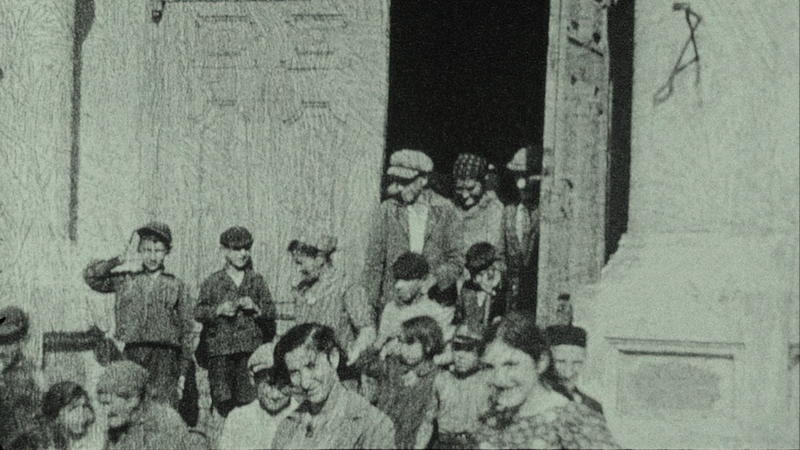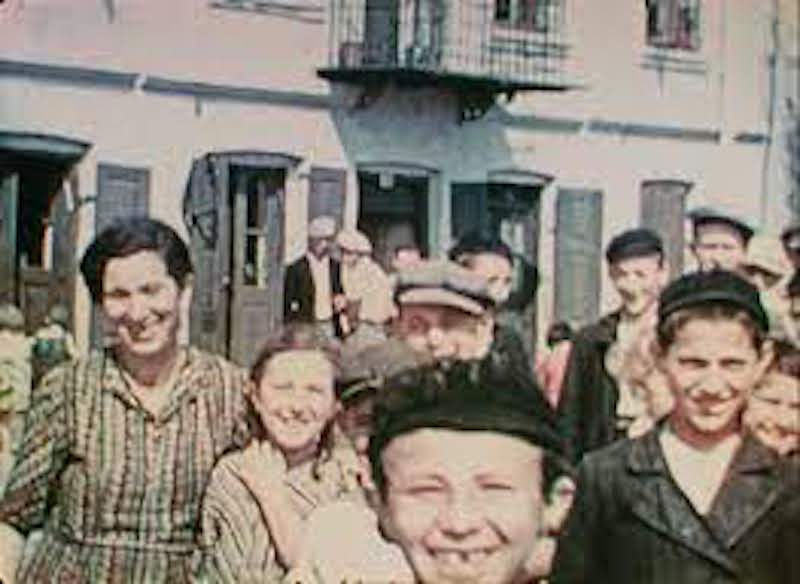Three Minutes: A Lengthening review - superb portrait of a vanished world | reviews, news & interviews
Three Minutes: A Lengthening review - superb portrait of a vanished world
Three Minutes: A Lengthening review - superb portrait of a vanished world
Found footage captures a summer's day in pre-war Poland

We hear the projector whirr as the mute 16mm film flows through the sprockets and on to the screen. For three minutes and a little longer we watch children and adults spilling out of buildings, intrigued by the novelty of a camera on their streets.
They smile, wave, and jostle each other. One or two of the kids pull faces. It could be any old amateur footage by a holidaymaker visiting a distant town where the locals are unused to cameras. But this is Poland in 1938 and what we are seeing is a community that was about to be destroyed.
These precious few minutes of celluloid were found in 2009 when Glenn Kurtz was going through his late grandfather’s things in Florida. David Kurtz and his family had left Poland for America when he was four. They were part of a great migration of Eastern European Jews in the 1890s looking for a better life in the New World, far away from pogroms and the restrictions they had endured for decades. He returned as a successful middle-aged man, enjoying a grand tour of Europe with his wife Lisa, and stopping off in his old home town of Nasielsk, some 30 miles north of Warsaw.
Kurtz had bought the camera just before the holiday, his amateur handling of it – we see his walking stick waving in the frame, probably as he tries to fend off the excited children – adds to the poignancy of the images. The original, faded colour creates a vivid nostalgia for a town where women dressed in brightly printed frocks and one of the local industries was a factory that made elaborate buttons.
 After Glenn Kurtz's discovery, the film was donated to the US Holocaust Memorial Museum and painstakingly restored, digitised, and put on the museum's website. The detective work had begun, establishing the exact location, the time of day, the date: 4 August, 1938.
After Glenn Kurtz's discovery, the film was donated to the US Holocaust Memorial Museum and painstakingly restored, digitised, and put on the museum's website. The detective work had begun, establishing the exact location, the time of day, the date: 4 August, 1938.
It wasn't an easy task given that the images were shaky in the first place and the gelatine that had held them had deteriorated over the 70 years since they were filmed. Even more miraculous was the way Maurice Chandler, finding the film on the internet, recognised himself as one of the cheerful teenagers posing for the camera.
Chandler now lives in America. His interview forms one of the key voices in Bianca Stigter's beautifully crafted documentary. Helena Bonham-Carter’s well-modulated narration, accounts by other survivors, location sound effects, and a sparse but very effective score form the audio track.
There are no talking heads breaking the frame. Unlike other documentaries that touch on Jewish life before it was destroyed by the Nazis (the Oscar-winning The Last Days and Claude Lanzmann’s epic Shoah among others), Three Minutes: A Lengthening makes no return to the locations we see in the archive footage. Instead Stigter reworks Kurtz’s footage, pores over it, and makes us wonder about the fate of each of the people we see on the screen.
The winter of 1939 saw Nasielsk occupied by the Germans; its 3,000 Jewish inhabitants were rounded up in the market square seen in the footage. (They were outnumbered by their Christian neighbours, only a few of whom tried to help them.) They were either marched off to the railway station to be shipped to ghettoes and camps, or crammed into a cold building and locked in with no food for days. Testimony from an account of their fate comes from the Emanuel Ringelblum archive. Rather than resort to over familiar Holocaust archive from the camps and ghettoes (mostly tainted by being filmed as Nazi propaganda in the first place), Stigler places the eye-witness's description over monochrome abstract frames of Kurtz’s film.
In the 1990s I made a TV programme for the BBC about how the Holocaust had been represented on film – both in features and in documentaries. I was lucky enough to interview a distant cousin by marriage who had survived Auschwitz and lived in Brooklyn. She told me how difficult it had been to return to her beloved Polish hometown when she was met with hostility in the aftermath of the war.
She always watched any documentary footage from that era in the hope of seeing someone she knew, no matter how painful it was. She died in 2014. She would have loved Three Minutes: A Lengthening. Bianca Stigter, Glenn Kurtz – who wrote a book about his grandfather’s fragment of history – and everyone involved in making this documentary have performed a great service in bringing this lost world to the screen.
rating
Explore topics
Share this article
The future of Arts Journalism
You can stop theartsdesk.com closing!
We urgently need financing to survive. Our fundraising drive has thus far raised £49,000 but we need to reach £100,000 or we will be forced to close. Please contribute here: https://gofund.me/c3f6033d
And if you can forward this information to anyone who might assist, we’d be grateful.

Subscribe to theartsdesk.com
Thank you for continuing to read our work on theartsdesk.com. For unlimited access to every article in its entirety, including our archive of more than 15,000 pieces, we're asking for £5 per month or £40 per year. We feel it's a very good deal, and hope you do too.
To take a subscription now simply click here.
And if you're looking for that extra gift for a friend or family member, why not treat them to a theartsdesk.com gift subscription?
more Film
 Blu-ray: The Graduate
Post #MeToo, can Mike Nichols' second feature still lay claim to Classic Film status?
Blu-ray: The Graduate
Post #MeToo, can Mike Nichols' second feature still lay claim to Classic Film status?
 Little Trouble Girls review - masterful debut breathes new life into a girl's sexual awakening
Urska Dukic's study of a confused Catholic teenager is exquisitely realised
Little Trouble Girls review - masterful debut breathes new life into a girl's sexual awakening
Urska Dukic's study of a confused Catholic teenager is exquisitely realised
 Young Mothers review - the Dardennes explore teenage motherhood in compelling drama
Life after birth: five young mothers in Liège struggle to provide for their babies
Young Mothers review - the Dardennes explore teenage motherhood in compelling drama
Life after birth: five young mothers in Liège struggle to provide for their babies
 Blu-ray: Finis Terrae
Bleak but compelling semi-documentary, filmed on location in Brittany
Blu-ray: Finis Terrae
Bleak but compelling semi-documentary, filmed on location in Brittany
 Oslo Stories Trilogy: Sex review - sexual identity slips, hurts and heals
A quietly visionary series concludes with two chimney sweeps' awkward sexual liberation
Oslo Stories Trilogy: Sex review - sexual identity slips, hurts and heals
A quietly visionary series concludes with two chimney sweeps' awkward sexual liberation
 Sorry, Baby review - the healing power of friendship in the aftermath of sexual assault
Eva Victor writes, directs and stars in their endearing debut feature
Sorry, Baby review - the healing power of friendship in the aftermath of sexual assault
Eva Victor writes, directs and stars in their endearing debut feature
 Blu-ray: Who Wants to Kill Jessie?
Fast-paced and visually inventive Czech comedy
Blu-ray: Who Wants to Kill Jessie?
Fast-paced and visually inventive Czech comedy
 Oslo Stories Trilogy: Love review - freed love
Gay cruising offers straight female lessons in a heady ode to urban connection
Oslo Stories Trilogy: Love review - freed love
Gay cruising offers straight female lessons in a heady ode to urban connection
 Beating Hearts review - kiss kiss, slam slam
Romance and clobberings in a so-so French melodrama
Beating Hearts review - kiss kiss, slam slam
Romance and clobberings in a so-so French melodrama
 Materialists review - a misfiring romcom or an undercooked satire?
Writer-director Celine Song's latest can't decide what kind of film it is
Materialists review - a misfiring romcom or an undercooked satire?
Writer-director Celine Song's latest can't decide what kind of film it is
 theartsdesk Q&A: actor Leonie Benesch on playing an overburdened nurse in the Swiss drama 'Late Shift'
The Guildhall-trained German star talks about the enormous pressures placed on nurses and her admiration for British films and TV
theartsdesk Q&A: actor Leonie Benesch on playing an overburdened nurse in the Swiss drama 'Late Shift'
The Guildhall-trained German star talks about the enormous pressures placed on nurses and her admiration for British films and TV

Add comment